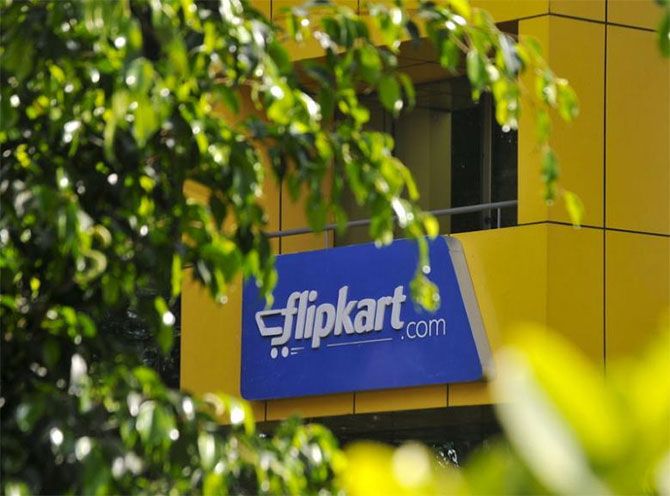US start-ups crash and burn frequently, so why the concern about start-up losses in India?
The principal reason, says Kanika Datta, is that Indian start-ups clone ideas from the US. Flipkart, Ola, Oyo, Paytm -- the most glamorous of the lot -- are variations of ideas developed in the US.

Photograph: Abhishek N Chinnappa/Reuters.
India's approach to our start-ups is much like our attitude to our sporting achievements.
Every success provokes a disproportionate degree of pride. A bronze medal in the Olympics invariably attracts effusive front page coverage, a single silver yields an Arjuna award, a Padma Shri, luxury cars and dozens of cash prizes.
So it is with our start-ups. Their fund-raising and dizzying valuations attract mandatory front page space and every aspiring writer has tried his or her hand at breathlessly chronicling their stories.
Both attitudes are misplaced, but why do they persist?
As with our international sporting achievements, the start-ups provide us some sort of validation that India is right up there with the very latest global business developments. The fact that foreign venture capitalists and private equity mavens find untried Indian entrepreneurs worthy of their capital makes us giddy with pride.
This self-worth has much to do with the fact that start-ups magically encompass in one way or another all the emblems of shining, aspirational India: Hard-working middle class youth, the frequent IIT/IIM connection, foreign capital, online/digital prowess and so on.
If the US has Silicon Valley why, India has multiple replicas, or so the fable goes, in Bengaluru and Pune (Gurgaon makes the occasional feeble claim). Photographs of grinning young fellows (and the occasional woman), self-consciously casual and confident underscore the optimistic narrative we'd like the world to know.
The grim problem of poverty seems to shrink before this glittering, expanding opportunity for anyone with the chutzpah to convince an investor to part with cash.
Yet it is worth wondering why, barely 10 years into this chic business that provokes so much nationalist pride, valuations are being sharply slashed, and the health of these businesses is worrying, to put it mildly.
An analysis of 41 start-ups by Mint newspaper earlier this year showed that these companies collectively notched up losses of ₹16,000 crore to generate revenues of roughly ₹24,000 crore for the year ended March 2016.
In most cases, the analysis shows, losses exceed valuations by a fair margin.
By conventional standards, under which companies are judged on a less ephemeral metric than 'valuations', most of these start-ups would be sick companies.
In some ways, this kind of performance is par for the course in a high-risk, super-competitive environment. US start-ups crash and burn so frequently that no one blinks an eyelid and, even a giant like Amazon struggled to make money for over a decade.
There's a reason for the absence of worry about loss-making start-ups in Silicon Valley, and it goes beyond the storied robust environment that mitigates the downsides of risk-taking. Sure, the institutional environment enables entrepreneurs to cut their losses and move on. But more to the point, many of these failures are 'healthy', the result of blue-skies thinking of the kind that eventually produces an Amazon, Uber, Airbnb or the concept of driverless cars and flights to Mars.
So, why should we be concerned about start-up losses in India?
There are several reasons, but the principal one stems from the fact that Indian start-ups are not innovators. They clone ideas from the US -- Flipkart, Ola, Oyo, Paytm, the most glamorous of the lot, are variations of ideas that were developed and tested in the US.
If you run an eye down the Mint analysis, you will discover that most of these organisations are merely leveraging the reach of the internet to widen market access in goods and services -- whether it is furniture, fashion, jewellery, groceries, insurance policies and airline tickets.
To be clear, there is nothing wrong with building a business on this basis -- most businesses worldwide are, at bottom, emulative of someone else's Big Idea. In the digital space, where entry barriers are proverbially low, this trend is likely to accelerate.
But the spin that's put on Indian start-up promoters as breakthrough thinkers is misplaced.
In fact, they are actually symbols of another kind that India should celebrate just as much: Of the progressive ease of doing business for ordinary entrepreneurs, who wield little influence in the corridors of power.
This represents the age of the genuine businessperson, not the policy manipulator of the Licence Raj.
The fact that they are able to create companies and run businesses despite the daunting hurdles that the average SME (small and medium-sized enterprises) entrepreneur still faces is testimony to their acumen. Managing a consistently efficient delivery model in India's chaotic environment is no small talent.
Within that template, there have been some critical innovations of course -- such as Flipkart's cash-on-delivery model, which certainly widened the ambit of the online delivery market.
But these are tweaks to suit the Indian market, not seminal ideas in themselves. That is why the rate of cash burn is causing hitherto open-handed investors to pause, a signal perhaps for Indian start-up entrepreneurs to learn the sobering art of consolidation.











